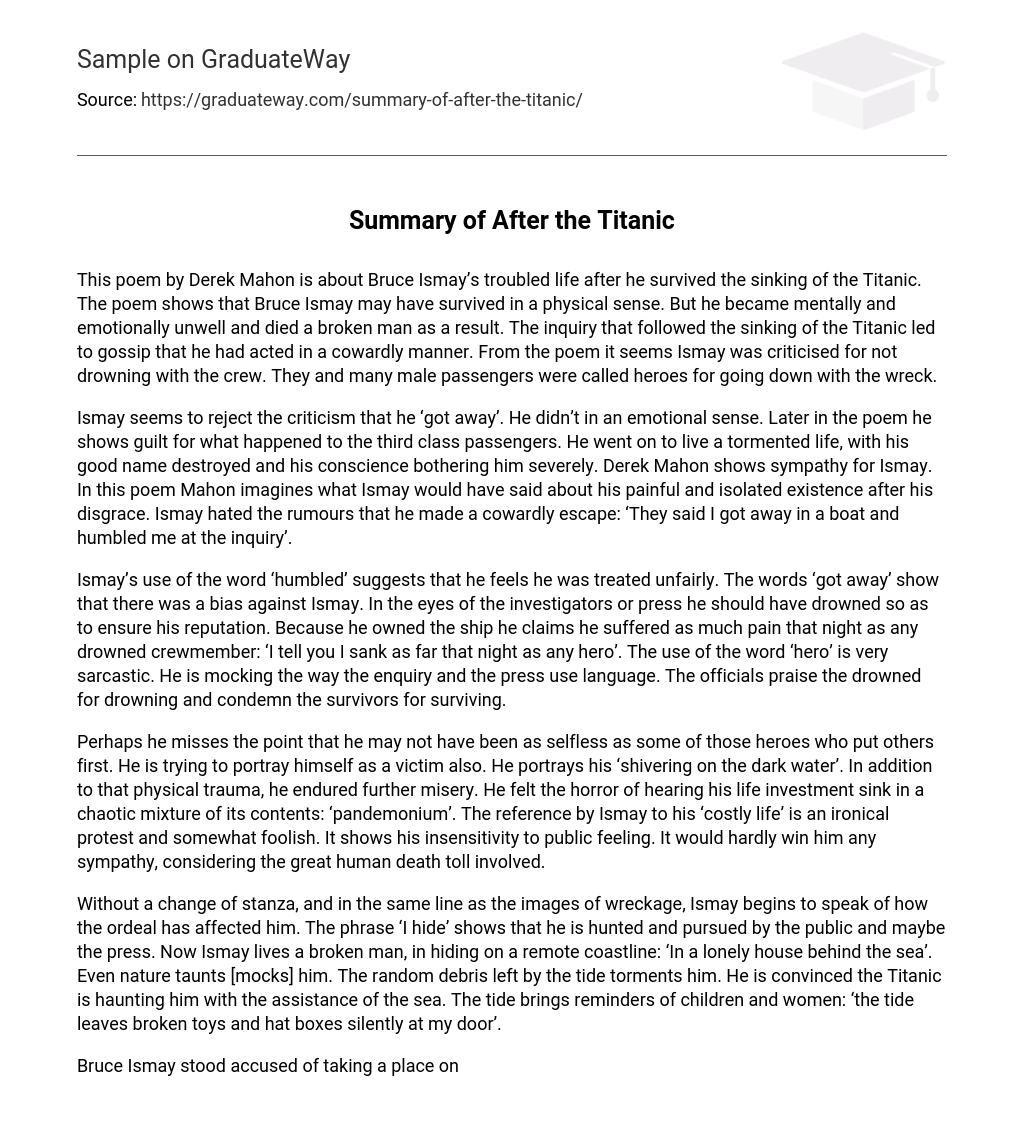This poem by Derek Mahon is about Bruce Ismay’s troubled life after he survived the sinking of the Titanic. The poem shows that Bruce Ismay may have survived in a physical sense. But he became mentally and emotionally unwell and died a broken man as a result. The inquiry that followed the sinking of the Titanic led to gossip that he had acted in a cowardly manner. From the poem it seems Ismay was criticised for not drowning with the crew. They and many male passengers were called heroes for going down with the wreck.
Ismay seems to reject the criticism that he ‘got away’. He didn’t in an emotional sense. Later in the poem he shows guilt for what happened to the third class passengers. He went on to live a tormented life, with his good name destroyed and his conscience bothering him severely. Derek Mahon shows sympathy for Ismay. In this poem Mahon imagines what Ismay would have said about his painful and isolated existence after his disgrace. Ismay hated the rumours that he made a cowardly escape: ‘They said I got away in a boat and humbled me at the inquiry’.
Ismay’s use of the word ‘humbled’ suggests that he feels he was treated unfairly. The words ‘got away’ show that there was a bias against Ismay. In the eyes of the investigators or press he should have drowned so as to ensure his reputation. Because he owned the ship he claims he suffered as much pain that night as any drowned crewmember: ‘I tell you I sank as far that night as any hero’. The use of the word ‘hero’ is very sarcastic. He is mocking the way the enquiry and the press use language. The officials praise the drowned for drowning and condemn the survivors for surviving.
Perhaps he misses the point that he may not have been as selfless as some of those heroes who put others first. He is trying to portray himself as a victim also. He portrays his ‘shivering on the dark water’. In addition to that physical trauma, he endured further misery. He felt the horror of hearing his life investment sink in a chaotic mixture of its contents: ‘pandemonium’. The reference by Ismay to his ‘costly life’ is an ironical protest and somewhat foolish. It shows his insensitivity to public feeling. It would hardly win him any sympathy, considering the great human death toll involved.
Without a change of stanza, and in the same line as the images of wreckage, Ismay begins to speak of how the ordeal has affected him. The phrase ‘I hide’ shows that he is hunted and pursued by the public and maybe the press. Now Ismay lives a broken man, in hiding on a remote coastline: ‘In a lonely house behind the sea’. Even nature taunts [mocks] him. The random debris left by the tide torments him. He is convinced the Titanic is haunting him with the assistance of the sea. The tide brings reminders of children and women: ‘the tide leaves broken toys and hat boxes silently at my door’.
Bruce Ismay stood accused of taking a place on the lifeboats from women and children. It probably seemed to the inquiry that he used his clout as the owner of the ship, to secure a precious place on a lifeboat. Maybe after the inquiry Ismay realised the extent of the tragedy he had been responsible for and began to feel private guilt. The imagery shows Bruce Ismay has been damaged by the inquiry. He has been made to suffer so much embarrassment that he has lost his mind. He is paranoid [fearful] and sees a symbol of his guilt in every detail of his life. He has no joy in the summer season: flowers of May mean nothing to me’. He experiences great pain when the wind blows from the sea. He can’t handle his past, because of the way he was treated at the enquiry. He is so helpless he cannot face people. Ismay has overheard his gardener telling strangers that he remains in bed, using cocaine to numb or ease his pain. He suffers nightmares in which those who died on the Titanic haunt him. He experiences the feeling of drowning with them as he pictures their lost faces. He admits that he never understood them or felt for their plight when they drowned.
He was a rich man and didn’t care for their welfare, perhaps because many of them were third class passengers: ‘Lost faces I never understood’. His soul and heart suffer immensely: ‘my poor soul screams out in the starlight’. Ismay is a tragic figure. At first he felt he was the victim of an injustice at the inquiry. But later he suffered great personal guilt for what happened. Perhaps Mahon takes Ismay’s side due to his immense suffering and his private confession of his guilt. Ismay is so hurt that he asks the mourners to grieve for him along with the drowned victims: ‘Include me in your lamentations’.





